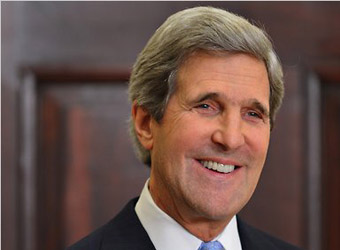U.S. Secretary of State John Kerry said on Saturday it is vital that Egypt revive its economy and that the country’s fractious political parties reach agreement on painful economic reforms to secure an IMF loan.
The country’s foreign currency reserves have dived to little more than a third of levels before the 2011 revolution and the budget deficit is soaring as a sliding Egyptian pound pushes up the cost of state subsidies for imported fuel and food.
“It is paramount, essential, urgent that the Egyptian economy get stronger, that it gets back on its feet,” Kerry told Egyptian and U.S. business executives in Cairo. “It’s clear to us that the IMF arrangement needs to be reached.”
The Islamist government of President Mohamed Morsi said on Thursday it would invite an IMF team to reopen talks on a $4.8 billion loan that was agreed last November but put on hold at Cairo’s request during street violence the following month.
Two years after the overthrow of Hosni Mubarak, the most populous Arab nation is deeply divided with many opposition parties promising to boycott parliamentary elections due to be held in four stages between April and June.
With an IMF deal likely to involve painful measures, Kerry called for consensus on tackling the problems.
“We do believe that in this moment of serious economic challenge that it’s important for the Egyptian people to come together around the economic choices and to find some common ground,” he said after meeting Foreign Minister Mohamed Kamel Amr.
Amr made clear that Egypt, which has a peace treaty with Israel and has close military relations with the United States, expected Washington’s help in stabilizing the economy.
“We expect from friends, particularly from the United States, as a strategic partner to Egypt, to stand (by) Egypt during this period in the economic arena,” Amr said through an interpreter, standing alongside Kerry at the Foreign Ministry.
Washington wanted to support democracy in Egypt, Kerry said, but was not seeking to favour any one party over another in what has become a deeply polarized society. He appeared to try to combat the believe among some Egyptians that the United States has in effect sided with the Muslim Brotherhood.
“We are not here to interfere, we are here to listen,” he said. “We are not here to urge anybody to take one particular action or another … What we support is democracy and the people and the nation of Egypt.”
CLASHES IN EGYPTIAN CITIES
A group of anti-Morsi demonstrators set fire to pictures of Kerry outside the Foreign Ministry, the state MENA news agency reported, before Kerry arrived to meet Amr.
Earlier, the demonstrators had marched from Tahrir Square, the centre of the 2011 uprising. Some held up cartoons of Kerry, portraying him with an Islamic beard, saying “Kerry – member of the Brotherhood”. Others banners said “Kerry, you are not welcome here” and showed the characteristic moustache and fringe of Adolf Hitler superimposed on pictures of Morsi.
The protest was peaceful. However, youths fought interior ministry police on Saturday in the Nile Delta city of Mansoura, where one protester was killed and dozens injured. In the Suez Canal city of Port Said, protesters torched a police station, security sources said.
While these protests were unrelated to Kerry’s visit, they were examples of the frequent outbreaks of unrest. Clashes are commonplace, with protesters demanding that Morsi reform the interior ministry’s police force. Police reform was a main demand of the uprising that toppled Mubarak.
SLIM HOPES
Hopes for consensus between the ruling Islamists and opposition parties seem slim. Liberal and leftist opposition parties plan to boycott elections because of a new constitution produced by an Islamist-dominated assembly and other grievances.
Kerry met opposition leaders on Saturday but many senior figures were missing from the round table talks, including Hamdeen Sabahy, who came a close third in presidential elections last year but had refused to attend the meeting.
However, Kerry met separately with Amr Moussa, a former Arab League Secretary-General and defeated presidential candidate, and spoke on the telephone with another party leader, former U.N. nuclear agency head Mohamed ElBaradei.
Kerry said he would talk to Morsi on Sunday about what the United States could offer Egypt, including economic assistance, support for private business and boosting Egypt’s exports to the United States. But Washington needed to know “that Egypt is going to make the right fundamental economic decisions with respect to the IMF”, he said.
Signs of economic stress abound. Imports of wheat, needed to feed a fast growing population of 84 million, are down sharply so far this year even though the government said food importers are getting priority allocation of dollars.
Earlier this month, the government also announced a 50 percent rise in the price of subsidized fuel oil for customers outside priority industries that include food and power production. The central bank has reduced the supply of dollars auctioned to commercial banks, forcing many businesses to turn to the black market for foreign exchange.
Earlier, a senior U.S. official said Washington believed Egypt needed to increase tax revenues and cut energy subsidies to secure an IMF loan – measures likely to be highly unpopular if Morsi’s Muslim Brotherhood government forces them through.
Egypt’s investment minister has expressed hope that a deal could be done with the IMF by the end of April.
The loan was delayed due to violence over a planned rise in taxes. While the tax rise was withdrawn, Morsi is likely to face more trouble as any cuts in subsidies demanded by the IMF will push up living costs in a country where poverty is rife.
Reuters


